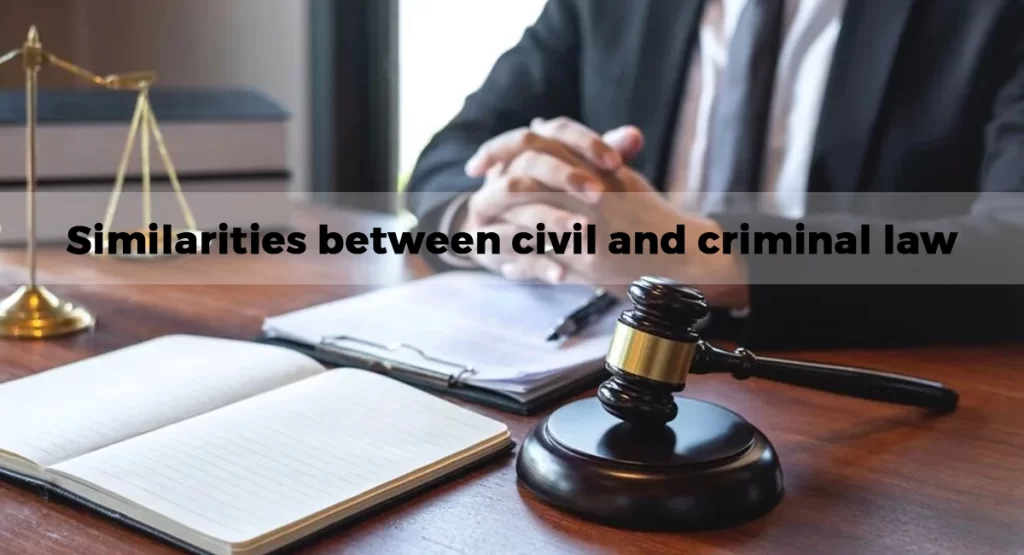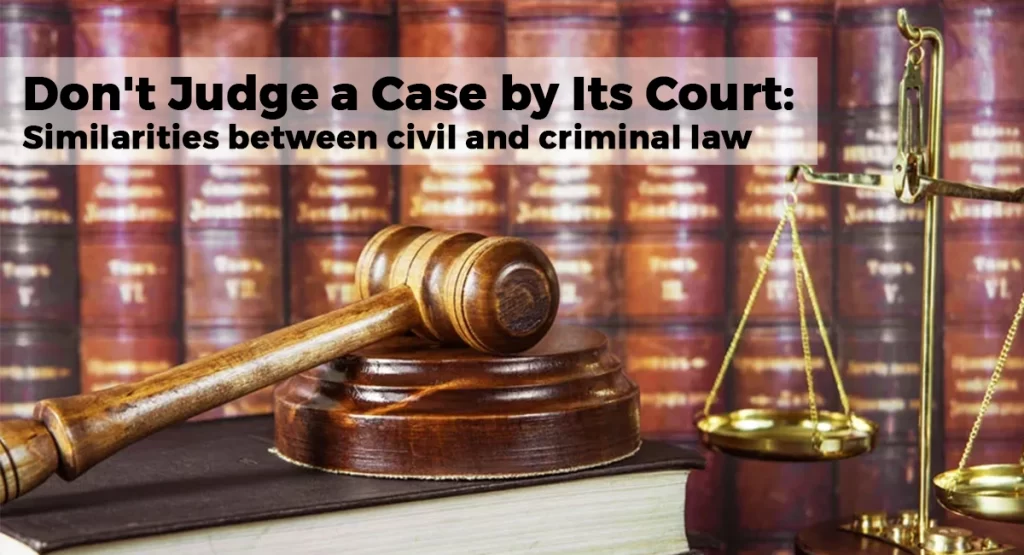Similarities Between Civil and Criminal Law are very much in common. In both criminal cases and civil lawsuits, there are two sides: the person making the accusation (plaintiff) and the person defending themselves (defendant). Both sides present evidence to prove their case. This can include witness testimony and physical evidence.
The legal system can seem like a complex web of rules and regulations. Two major branches, civil law and criminal law, often get confused. While they serve distinct purposes, there are surprising similarities in how they function. Let’s untangle the threads and explore the common ground between these two legal areas.
Understanding the Divide: Civil vs. Criminal Law
Imagine two scenarios:
- Scenario 1: You lend your neighbor money, but they refuse to pay you back.
- Scenario 2: Your neighbor breaks into your house and steals your valuables.
These situations highlight the key difference between civil and criminal law.
- Civil law deals with disputes between private parties, like your disagreement with your neighbor about the loan. Here, the goal is to resolve the issue and provide a remedy, such as getting your money back.
- Criminal law, on the other hand, focuses on offenses against society as a whole. Stealing is a crime, and your neighbor could face legal consequences from the state (police, prosecutors) in the form of jail time or fines.
Striking Similarities: Procedural Overlap
Despite their different objectives, civil and criminal cases share some key similarities in how they proceed:
- Burden of Proof: Both require proof to reach a decision. In civil cases, the “burden of proof” typically falls on the plaintiff (the one who files the lawsuit) to prove their case by a “preponderance of the evidence” (more likely than not). In criminal cases, the state must prove the defendant’s guilt beyond a reasonable doubt, a much higher standard.
- Right to Representation: Both parties in a civil case and the defendant in a criminal case have the right to legal representation by an attorney. A lawyer can advise you on your rights and navigate the legal process.
- Appeals Process: Dissatisfied with the outcome of your case? Both civil and criminal cases allow appeals to higher courts, offering a chance to challenge the initial decision.
- Evidence and Witnesses: Both types of cases rely on evidence (documents, physical objects, witness testimony) to support the claims being made. Rules govern how evidence is presented and admitted in court.
- Reaching a Decision: In a civil case, a judge or jury decides the outcome. In a criminal case, a jury decides guilt or innocence, while a judge determines sentencing.
Beyond Procedure: Shared Goals
While the specific goals of civil and criminal law differ, they ultimately share some common aims:
- Maintaining Order: Both systems strive to uphold order and deter wrongdoing. Civil law encourages fair dealing between individuals, while criminal law discourages harmful conduct.
- Providing Justice: Both seek a just outcome. In civil cases, this could involve awarding damages (money) to compensate for a loss. In criminal cases, it might involve punishment for a crime and protecting society.
When the Lines Blur: Overlapping Jurisdiction
Sometimes, a single situation can raise both civil and criminal concerns. For example, if your neighbor assaults you while stealing your valuables, you might face a criminal case against them for assault and theft. Additionally, you could pursue a civil lawsuit to recover the value of your stolen items.

Choosing the Right Path: Seeking Legal Guidance
If you find yourself embroiled in a legal situation, it’s crucial to understand whether you’re dealing with a civil or criminal matter. Consulting with an experienced attorney can help you navigate the complexities of the legal system. They can assess your situation, determine the appropriate course of action, and represent you in court if necessary.
Remember:
- Civil law focuses on resolving disputes between individuals and providing remedies.
- Criminal law focuses on punishing offenses against society.
- Both systems share procedural similarities and aim to maintain order and provide justice.
By understanding these similarities and seeking legal counsel when needed, you can navigate the legal system with greater confidence.

